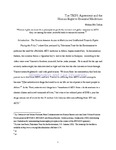| dc.rights.license | In Copyright | en_US |
| dc.creator | McClellan, Melissa D. | |
| dc.date.accessioned | 2013-12-20T14:16:56Z | |
| dc.date.available | 2013-12-20T14:16:56Z | |
| dc.date.created | 2004 | |
| dc.identifier | WLURG38_Mcclellan_POV_2004_wm | |
| dc.identifier.uri | http://hdl.handle.net/11021/26034 | |
| dc.description | Melissa D. McClellan is a member of the Class of 2005 of Washington and Lee University School of Law. | en_US |
| dc.description | Capstone; [FULL-TEXT FREELY AVAILABLE ONLINE] | en_US |
| dc.description.abstract | Of course, patents are not the only, or even the primary, roadblocks to accessible medicine in developing nations. Over one-third of the world's population lacks access to the drugs on the WHO [World Health Organization] list of Essential Medicines, the great majority of which are not protected by patents in any country. As noted in a joint study by the WHO and WTO [World Trade Organization], "[t]he fact that billions of people lack access to essential drugs, most of which are not protected by patents,underscores the other problems contributing to inadequate access." The study identifies possible contributing factors to include insufficient distribution systems, poor financing, lack of capacity to import drugs, and the affordability of generic drugs for people in poor countries.
. . .
It does not follow, however, that because additional factors affect access to drugs the Members of the WTO should not attempt to make intellectual property laws socially responsible and responsive to human rights. . . . By shifting its focus from "public health" to individual human rights, the WTO could improve the clarity and effectiveness of the measures it has already taken to increase access to essential medicine. [From Conclusion] | en_US |
| dc.description.statementofresponsibility | Melissa D. McClellan | |
| dc.format.extent | 30 pages | en_US |
| dc.language.iso | en_US | en_US |
| dc.rights | This material is made available for use in research, teaching, and private study, pursuant to U.S. Copyright law. The user assumes full responsibility for any use of the materials, including but not limited to, infringement of copyright and publication rights of reproduced materials. Any materials used should be fully credited with the source. | en_US |
| dc.rights.uri | http://rightsstatements.org/vocab/InC/1.0/ | en_US |
| dc.subject.other | Washington and Lee University, Shepherd Poverty Program | en_US |
| dc.title | The TRIPS Agreement and the Human Right to Essential Medicines | en_US |
| dc.type | Text | en_US |
| dcterms.isPartOf | RG38 - Student Papers | |
| dc.rights.holder | McClellan, Melissa D. | |
| dc.subject.fast | Public health | en_US |
| dc.subject.fast | Agreement on Trade-Related Aspects of Intellectual Property Rights (1994) | en_US |
| dc.subject.fast | Compulsory licensing of patents | en_US |
| dc.subject.fast | Human rights | en_US |
| dc.subject.fast | Universal Declaration of Human Rights (United Nations. General Assembly) | en_US |
| dc.subject.fast | World Trade Organization | en_US |
| dc.subject.fast | World Health Organization | en_US |
| local.department | Shepherd Poverty Program | en_US |
| local.scholarshiptype | Capstone | en_US |
